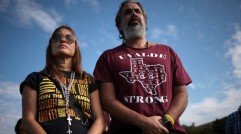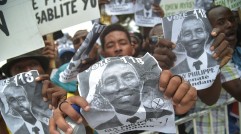Dominican Republic News 2014: Nation Decriminalizes Abortion By Changing Constitution
Dominican Republic's President Danilo Medina changed the country's amended Penal Code to allow women access to safe abortion services in cases of rape, incest, fetal impairment and when the life of the pregnant woman is at risk. The country's constitution originally recognized human life at beginning at conception.
Medina's move comes just after the country's lawmakers introduced a bill to protect the woman's life if it was in risk from a pregnancy and were due to introduce a second bill supporting abortion in the case of rape, incest or fetal impairment.
President Medina has changed all that and called on Congress to make the necessary changes to the country's law to be in line with international human rights standards. It becomes the 36th country to decriminalize abortion in the last 20 years ending the country's absolute ban and its subsequent harsh penalties.
Advocates are calling the decision a momentous step toward expanding access to safe and legal abortion.
"Although the Dominican Republic has only allowed legal abortion in limited circumstances, it is still an important step forward for women's rights in the country," said Monica Arango, regional director for Latin America and the Caribbean at the Center for Reproductive Rights. "We must now work to hold the leadership accountable and ensure this critical change is fully implemented and women are able to access essential reproductive health care they need and deserve."
A draft bill to regulate abortion in the case of rape, incest or fetal impairments will be presented during the legislative session in February 2015.
The Catholic Church who supported Medina in his election bid in 2012 is outraged, and the decision led to the resignation of a key church official who had mediated between the church and president. Catholics and Evangelical Protestants have rallied in their hundreds in front of Congress in Santo Domino praying in large groups.
The ban on abortions in Dominican Republic has led to more than 90,000 unsafe abortions each year.
"No longer will women facing a pregnancy from rape or life-threatening complications be forced to live under a cloud of fear in the Dominican Republic," said Nancy Northup, president and CEO of the Center for Reproductive Rights.
There are only five countries left in Latin America -- Chile, El Salvador, Haiti, Honduras and Nicaragua -- that ban abortion with no exceptions.
In March, lawmakers and civil society leaders from over 30 countries called for universal access to safe, legal abortions and comes in the context of 20 year review by the United Nations of the 1994 International Conference on Population and Development in Cairo. The call is for the decriminalization of abortion in all countries.
In the Unites States, however, because of anti-abortion lawmakers were able to gain control as state lawmakers and as governors during the 2010 elections, during the period 2011-2013, legislatures in 30 states enacted 205 new laws restricting abortion -- more than the total number enacted in an entire previous decade, according to the Guttmacher Institute.
Subscribe to Latin Post!
Sign up for our free newsletter for the Latest coverage!













